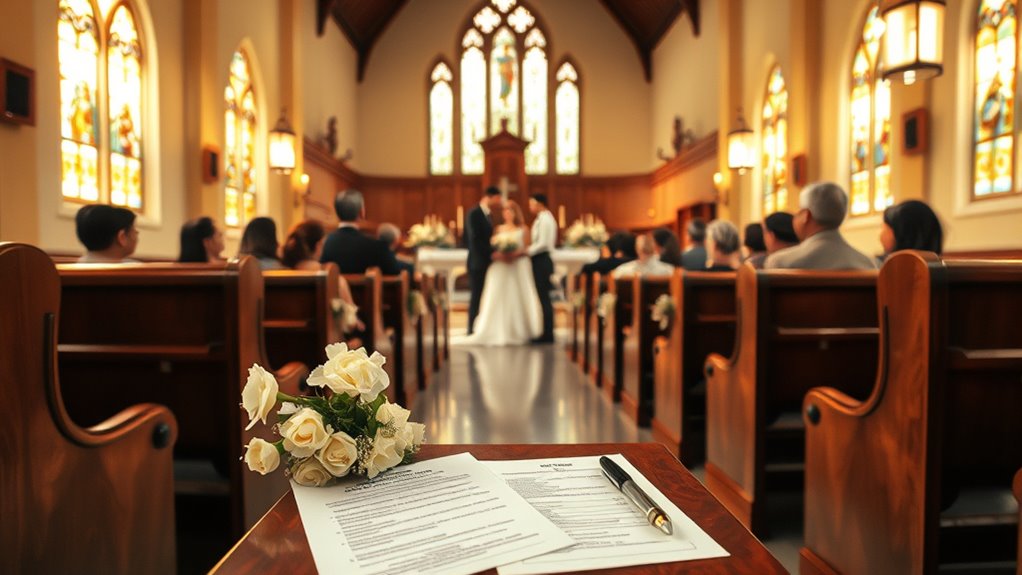Understanding the legalities of a church wedding in the Philippines is essential for your union to be both spiritually significant and legally binding. You’ll need a valid marriage license, which requires personal appearance at your local civil registrar’s office. Additionally, your church must be government-recognized to guarantee your marriage is valid. Documentation like annulment papers and a Certificate of No Marriage may also be necessary. To grasp all the details, there’s more you should know.
Key Takeaways
- A valid marriage license from the local civil registrar is required before a church wedding in the Philippines.
- Both partners must present valid identification and any necessary divorce or annulment documents prior to the ceremony.
- The church officiant conducts the ceremony and must be recognized by the government for the marriage to be legally valid.
- Post-ceremony, the church is responsible for submitting the marriage certificate to the local registrar.
- Understanding both spiritual and legal aspects ensures that the marriage is recognized in both contexts.
Requirements for a Valid Marriage License
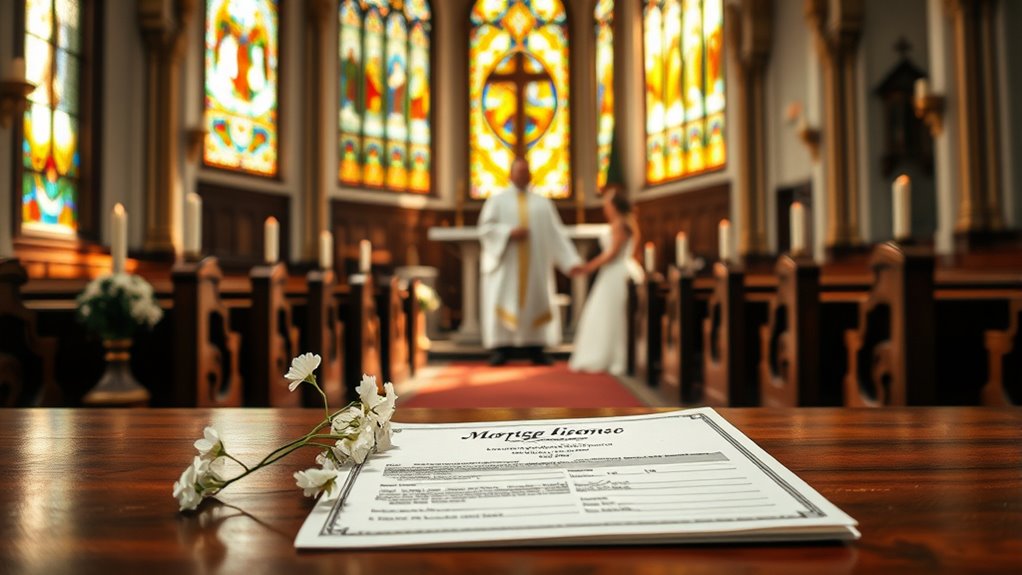
To guarantee your church wedding in the Philippines goes smoothly, you’ll need to secure a valid marriage license first. This process requires both partners to appear in person at your local civil registrar’s office.
You’ll need to present valid identification, such as a passport or a government-issued ID. If either of you has been married before, you’ll need a copy of the annulment or divorce decree.
Additionally, you may have to submit a Certificate of No Marriage (CENOMAR) to prove you’re free to marry. After submitting the necessary documents, you’ll typically wait for a few days to receive your marriage license.
Church-Specific Regulations and Guidelines
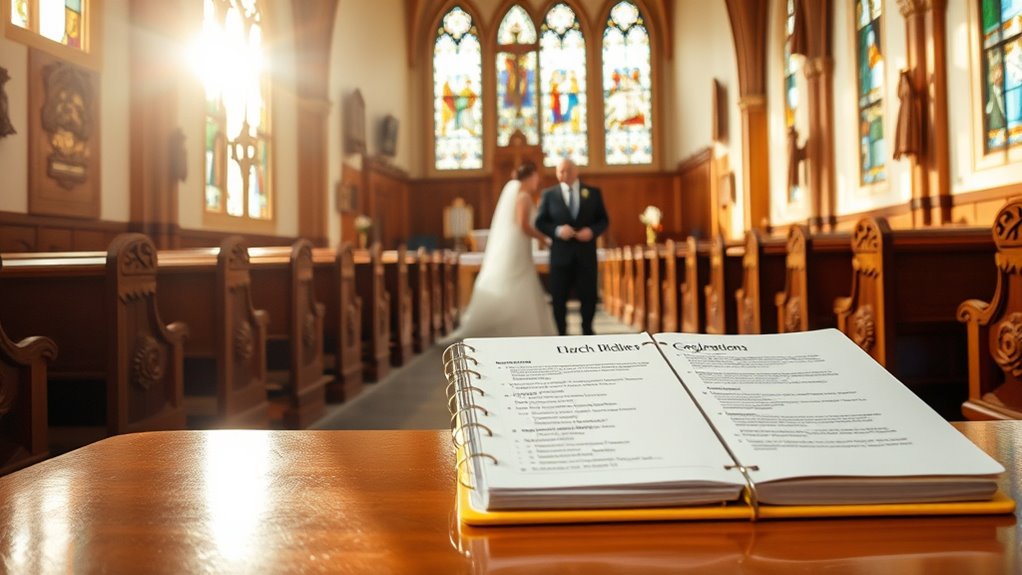
Once you have your marriage license in hand, it’s important to understand the specific regulations and guidelines set by the church where you plan to get married.
Each denomination may have unique requirements regarding pre-marriage counseling or seminars, so check if you’ll need to attend those. Some churches may require you to submit additional documents, like baptismal certificates or confirmation records.
You should also inquire about any restrictions on wedding dates and times, as well as the church’s policies on decorations and photography.
Don’t forget to discuss music choices and whether outside officiants are allowed. By understanding these guidelines early, you can guarantee a smooth and joyful wedding experience.
The Role of the Officiant in a Church Wedding
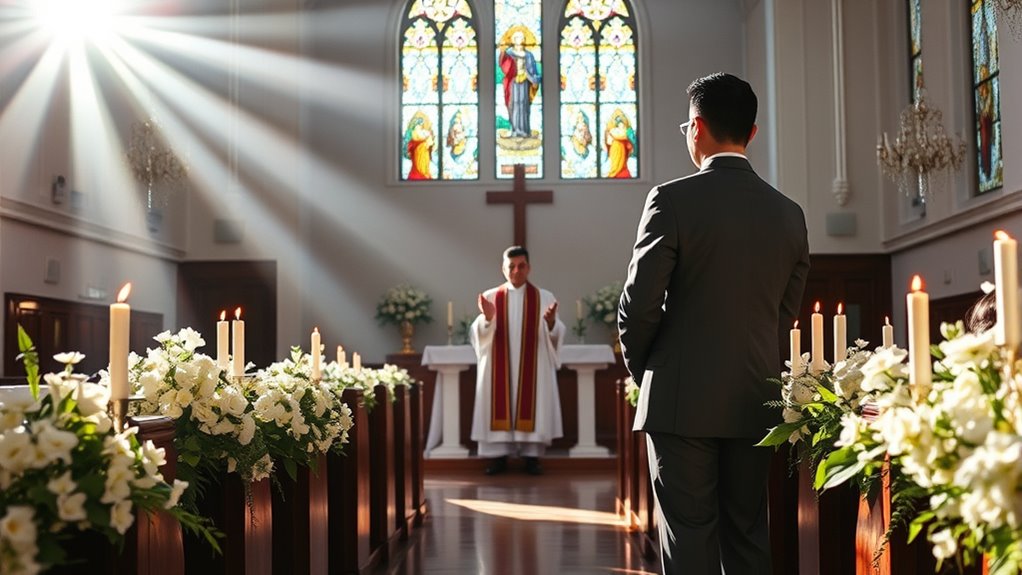
The officiant plays a crucial role in a church wedding, serving as the spiritual leader who guides the couple through their vows and the sacred rituals of the ceremony.
You’ll find that their presence adds depth and meaning to your special day. They prepare and conduct the ceremony, ensuring it aligns with the church’s traditions and beliefs.
The officiant also addresses the congregation, sharing insights about love, commitment, and the significance of marriage. They facilitate the exchange of rings and may lead prayers or readings that resonate with you.
The officiant enriches the ceremony, sharing wisdom on love and commitment while guiding the exchange of rings and meaningful readings.
Ultimately, the officiant helps create a memorable and heartfelt experience, making your wedding not just a legal formality but a genuine spiritual celebration of your union.
Necessary Documents for the Ceremony
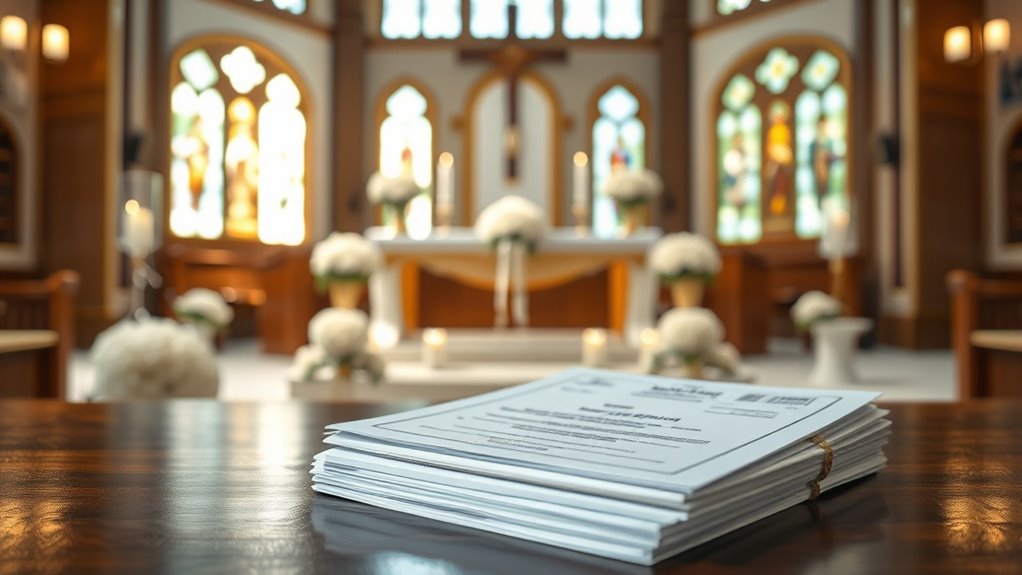
Before you walk down the aisle, gathering the necessary documents for your church wedding is essential.
First, you’ll need valid identification, such as a government-issued ID for both you and your partner. You’ll also require a marriage license, which you can obtain from your local civil registrar.
If either of you has been married before, be prepared to present your annulment or divorce papers. Additionally, a certificate of no marriage (CENOMAR) is often required, which proves you’re free to marry.
Some churches may ask for baptismal certificates or confirmation records, so check with your officiant.
Finally, it’s wise to have two witnesses present, as they’ll need to sign your marriage certificate after the ceremony.
Pre-Marriage Counseling and Seminars
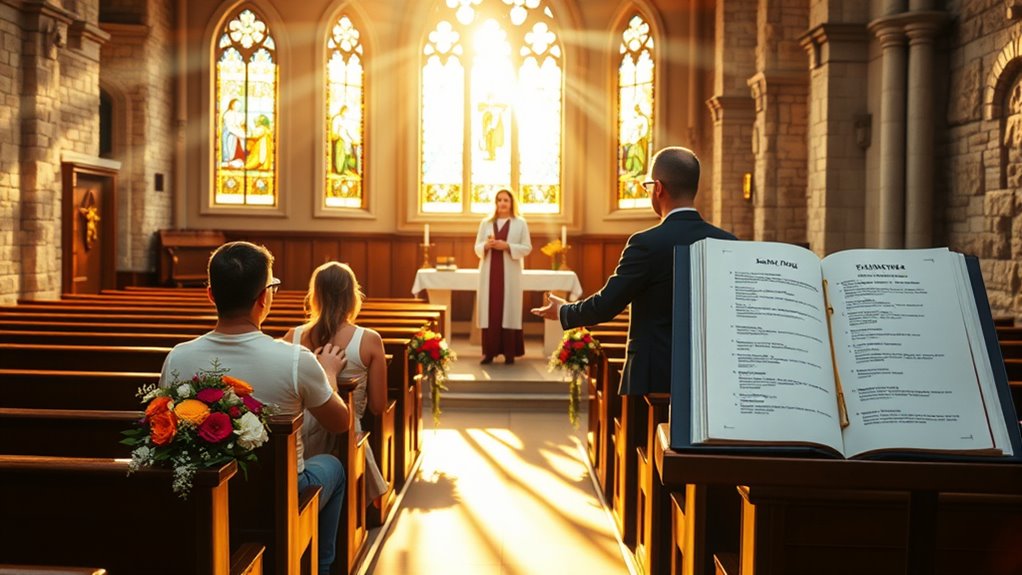
After gathering your necessary documents, attending pre-marriage counseling and seminars is an important step in your wedding preparations.
These sessions help you understand the commitment you’re making and equip you with the tools to build a strong marriage. Typically conducted by your church, these programs cover essential topics like communication, conflict resolution, and family planning.
You’ll also get the chance to meet other couples, fostering a sense of community and support.
Make certain to check the schedule and register early, as spots can fill up quickly. Completing this requirement not only prepares you spiritually and emotionally, but it also guarantees you’re in good standing with your church.
Embrace this opportunity to learn and grow together before your big day!
Understanding the Legal Implications of a Church Wedding
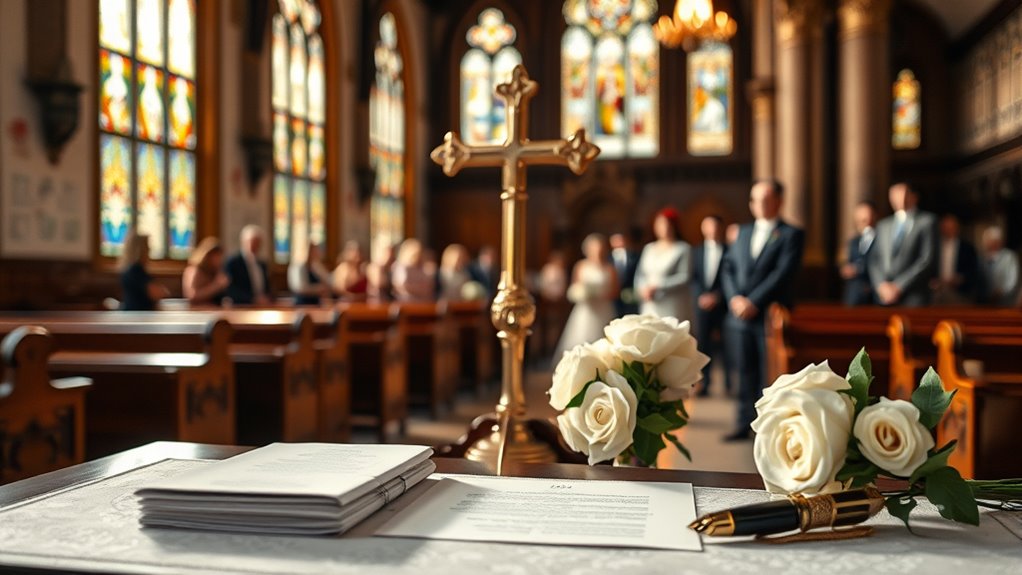
While planning your church wedding, it’s crucial to understand the legal implications that come with it. In the Philippines, a church wedding isn’t just a spiritual union; it also has legal significance.
You’ll need to secure a marriage license from the local civil registrar before your ceremony. This license is mandatory for the church to officiate your wedding. Additionally, verify that the church you’re choosing is recognized by the government, as this affects the validity of your marriage.
After your wedding, the church must submit your marriage certificate to the local civil registrar to officially record your union. Understanding these legal aspects helps guarantee your marriage is recognized both religiously and legally, providing you with the security and rights of a married couple.
Frequently Asked Questions
Can We Have a Church Wedding if One Partner Is Divorced?
If one partner’s divorced, you can still have a church wedding, but it depends on the church’s policies.
Many denominations require the divorced partner to obtain an annulment or a declaration of nullity before remarrying in the church.
Check with your specific church for their rules on this matter.
You’ll also want to guarantee both partners are prepared to meet any additional requirements set forth by the church.
Are Same-Sex Church Weddings Recognized in the Philippines?
Same-sex church weddings aren’t officially recognized in the Philippines.
Most religious institutions adhere to traditional views on marriage, which can make it challenging for same-sex couples to find a church willing to officiate their union.
While you might explore alternative venues and ceremonies, it’s important to know that legal recognition of same-sex marriages isn’t granted in the country.
You’ll need to contemplate other options for validating your relationship legally.
How Long Does the Marriage License Application Process Take?
The marriage license application process typically takes about 10 to 30 days, depending on your location and specific requirements.
You’ll need to gather necessary documents, such as identification and affidavits, and submit them to your local civil registrar.
After that, you may have to wait for the processing time, which varies by office.
It’s best to check with your local authority for exact timelines and requirements to guarantee a smooth application.
Can We Choose Any Church for Our Wedding Ceremony?
Yes, you can choose any church for your wedding ceremony, as long as it aligns with your beliefs and preferences.
However, it’s important to guarantee that the church you select is open to hosting weddings and that you meet their requirements.
Make sure to schedule a meeting with the officiant to discuss your plans and any specific guidelines they might have.
This way, you’ll create a meaningful and memorable ceremony.
What if One Partner Is a Foreign National?
If one partner’s a foreign national, you’ll need to gather specific documents.
Most churches require proof of your partner’s legal status, like a passport or a certificate of legal capacity to marry. They might also ask for additional paperwork, like a baptismal certificate or a confirmation certificate, depending on the church’s requirements.
It’s best to check with the church beforehand to guarantee you have everything needed for your special day.
Conclusion
In wrapping up, steering through the nuances of a church wedding in the Philippines can be both rewarding and revealing. Remember, it’s vital to check the church’s specific requirements, gather your documents, and engage in pre-marriage counseling. By doing so, you’ll not only guarantee a smooth ceremony but also strengthen your bond as a couple. So, prepare, plan, and proceed with passion for a perfect celebration of your love!
